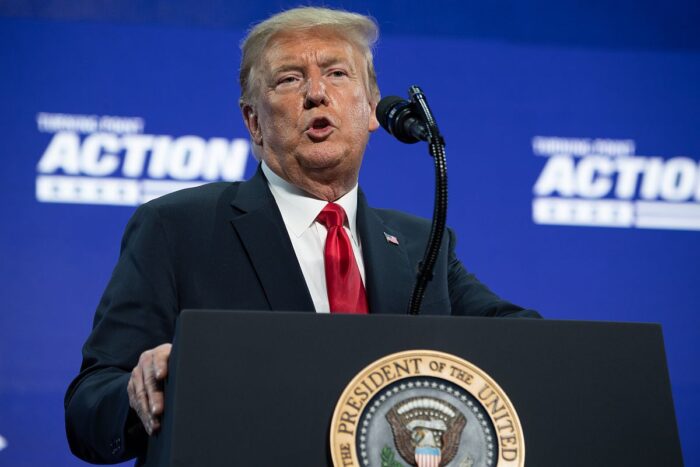New York: President Trump’s medical team on Sunday delivered an update on his condition, as the president’s personal physician acknowledged giving an overly rosy picture of his illness a day earlier.

The details of the briefing signaled to some health experts that the president’s condition might be more serious than a mild case of Covid-19, the disease caused by the coronavirus. “I didn’t want to give any information that might steer the course of illness in another direction, and in doing so, you know, it came off that we were trying to hide something, which wasn’t necessarily true,” Dr. Sean P. Conley, the White House physician, said in a briefing with reporters Sunday.
Based on the doctors’ account, Mr. Trump’s symptoms appear to have rapidly progressed since he announced early Friday morning that he had tested positive for the virus. Mr. Trump had a “high fever” on Friday, and there were two occasions when his blood oxygen levels dropped, his doctors said — on Friday and again on Saturday. The president’s oxygen saturation level was 93 percent at one point.
His doctors said, below the 95 percent that is considered the lower limit of the normal range. Many medical experts consider patients to have severe Covid-19 if their oxygen levels drop below 94 percent. The physicians said Mr. Trump had received supplemental oxygen at the White House on Friday; they were not clear about whether it had been administered again on Saturday, or whether his blood oxygen levels had fallen below 90 at some point.Dr. Conley said that the president had been given the steroid dexamethasone on Saturday, in addition to remdesivir, an antiviral drug.
Dexamethasone has been shown to help patients who are severely ill with Covid-19, but it is typically not used in mild or moderate cases of the disease.Because of the incomplete picture offered by the president’s doctors, it was not clear whether they had given him dexamethasone too quickly, or whether the president was far sicker than has been publicly acknowledged, experts in infectious disease and emergency medicine said on Sunday.“The dexamethasone is the most mystifying of the drugs we’re seeing him being given at this point,” said Dr. Thomas McGinn, the physician in chief at Northwell Health, the largest health care provider in New York State.
The drug is normally not used unless the patient’s condition seems to be deteriorating, he added. “Suddenly, they’re throwing the kitchen sink at him,” Dr. McGinn said. “It raises the question: Is he sicker than we’re hearing, or are they being overly aggressive because he is the president, in a way that could be potentially harmful? “The World Health Organization issued guidelines on Sept. 2 recommending that dexamethasone be given only to patients with “severe and critical Covid-19.” The National Institutes of Health has issued similar guidance, specifying that the drug is recommended only for people who require a mechanical ventilator to help them breathe, or who need supplemental oxygen.
A large study of dexamethasone in Britain found that the drug helped those who had been sick for more than a week, reducing deaths by one-third among patients on mechanical ventilators and by one-fifth among patients receiving supplemental oxygen by other means. Later Sunday, presumably to allay concerns, Mr. Trump posted an upbeat if rambling video praising his doctors at the Walter Reed National Military Medical Center.“It’s been a very interesting journey,” he said. “I learned a lot about Covid.” He added: “I get it, and I understand it.”Wearing a dark jacket and no necktie, Mr. Trump stood in the video and spoke energetically and with no apparent trouble breathing as he praised the “enthusiasm” of his supporters outside the hospital, then promised to pay them a surprise visit.
A short time later, Mr. Trump’s black SUV, escorted by Secret Service vehicles, appeared on the street. Mr. Trump could be seen in the back, wearing a suit and a mask and waving.
The stunt seemingly placed his Secret Service detail at risk of infection, as many pointed out. “The irresponsibility is astounding,” tweeted Dr. James P. Phillips, the chief of disaster medicine at George Washington University and an attending physician at Walter Reed.
He noted that the risk of coronavirus transmission inside a hermetically sealed vehicle was about “as high as it gets outside of medical procedures. “On Friday, Mr. Trump was given an infusion of an experimental antibody cocktail that is being tested in Covid-19 patients by the drug maker Regeneron. Mr. Trump is also receiving a five-day course of remdesivir, another experimental drug that is used in hospitalized patients and has been granted emergency authorization by the Food and Drug Administration.
Regeneron’s antibody cocktail is being tested early in the course of the infection, because it fights the virus itself and could prevent it from spreading throughout the body. Remdesivir is also an antiviral drug, but has been commonly used along with dexamethasone, which reduces the body’s immune response and is given later in the illness, when some people’s immune systems go into overdrive and attack their vital organs. On Sunday, the doctors said that Mr. Trump was in good spirits and that he was walking on his own and not complaining of shortness of breath.
“If he continues to look and feel as well as he does today, our hope is to plan for a discharge as early as tomorrow to the White House, where he can continue his treatment,” one of his doctors, Dr. Brian Garibaldi, said at the briefing on Sunday. But several medical experts said that the decision to prescribe dexamethasone to Mr. Trump did not align with that optimistic scenario.


Comments are closed.